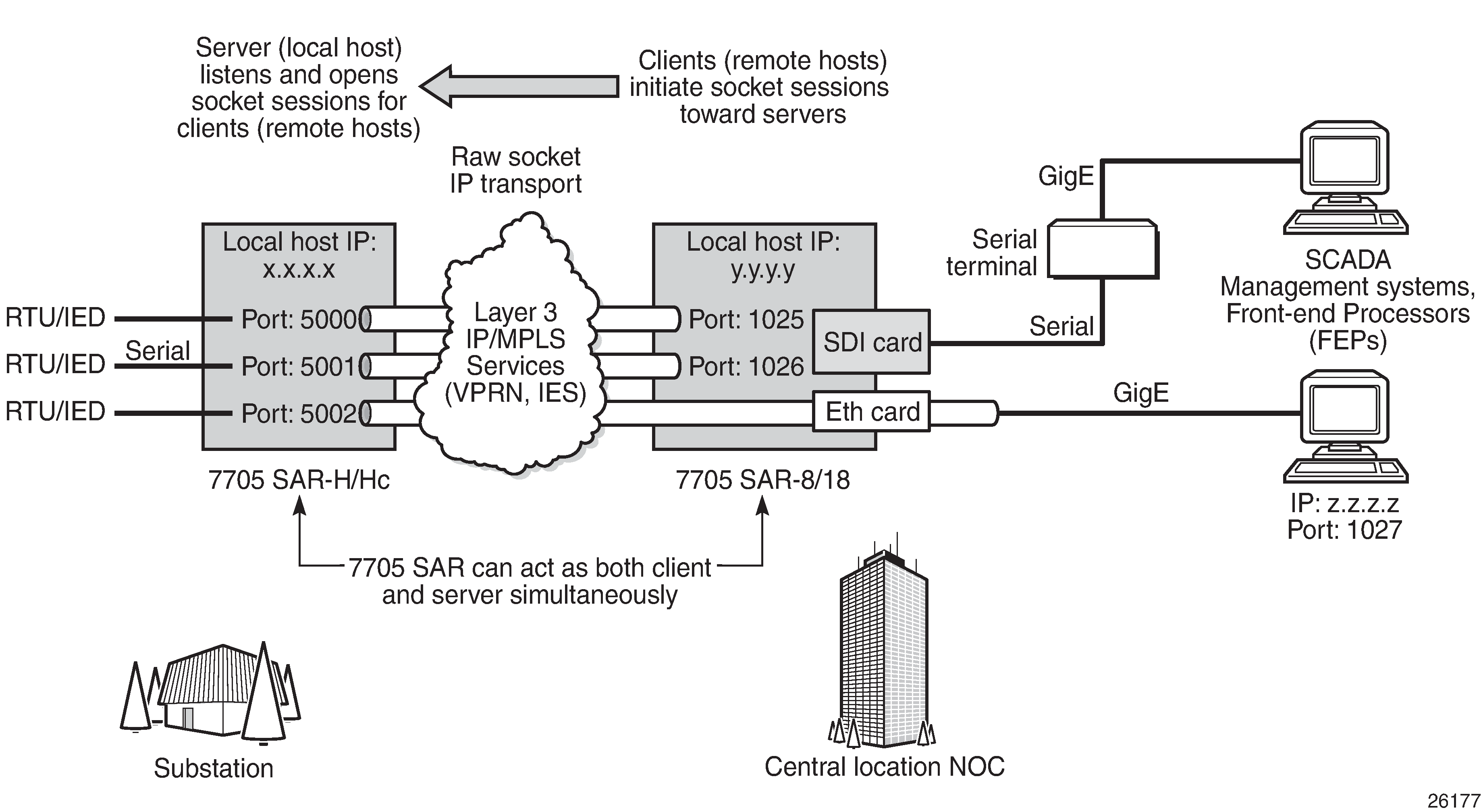Serial transport over raw sockets provides the capability of transporting serial data, in the form of characters, over an IP transport service within a Layer 3 IP/MPLS service (IES or VPRN). A raw socket allows direct sending and receiving of IP packets without any protocol-specific transport layer formatting. For information about raw socket IP transport services, refer to the 7705 SAR Services Guide, Service Overview chapter, ‟Raw Socket IP Transport Service”.
The feature provides the functionality for a local host to listen to and open raw socket sessions from remote hosts, and for a remote host to initiate and open raw socket sessions to local hosts. The local and remote host functions support TCP or UDP sessions (but not both concurrently) over the IP transport service.
Raw sockets are supported on the following hardware:
RS-232 ports on the 12-port Serial Data Interface card, version 2 and version 3
RS-232 ports on the 7705 SAR-Hc
RS-232 ports on the 4-port T1/E1 and RS-232 Combination module
RS-232 serial data can be carried over Cpipes or over raw sockets using IP transport. To use Cpipes, the RS-232 port must be configured with a channel ID. To use raw sockets, the RS-232 port must be configured with a socket ID.
The 12-port Serial Data Interface card supports a mix of Cpipes and raw socket serial links on the same card.
Figure: Serial Transport Over Raw Socket Application shows an example of a raw socket application, where serial data is transferred between RTUs and a utility’s SCADA management system using an IP transport service across a Layer 3 service (IES or VPRN), that includes 7705 SAR-H or 7705 SAR-Hc and 7705 SAR-8 Shelf V2 or 7705 SAR-18 nodes.
A raw socket local host (acting as a server) at the 7705 SAR-H/SAR-Hc substation listens to TCP sessions that originate at the 7705 SAR-8 Shelf V2/SAR-18 central location network operations center (NOC). The 7705 SAR-8 Shelf V2/SAR-18 at the NOC is connected to two front-end processors (FEPs), one via a serial port and another via an Ethernet port. The serial port on the 7705 SAR-8 Shelf V2/SAR-18 is configured as a remote host (acting as a client) that initiates TCP/UDP sessions towards the RTU at the 7705 SAR-H/SAR-Hc substation when traffic is received from the FEP over the serial port. These TCP/UDP sessions are transported over the IP/MPLS network using IP transport service over an IES or VPRN service. The serial data that is transported over the TCP/UDP session and received at the 7705 SAR-H/SAR-Hc is then sent over the serial link towards the RTU. TCP/UDP sessions received from the FEP over the Ethernet port are transported over an IES or VPRN service (that is, there is no need for serial remote host configuration in this case).
Multiple FEPs can poll a single RTU. If multiple sessions attempt to transmit serial data on the serial port simultaneously, the 7705 SAR queues packets per session and ensures that all data for one session is sent out before processing another session’s data, ensuring that sessions do not overlap one another.
A serial port can be concurrently configured as both a server (local host) and a client (remote host). This is accomplished with the local-host command configuration to support the server function and the remote-host command configuration to set up client sessions to far-end remote hosts.
